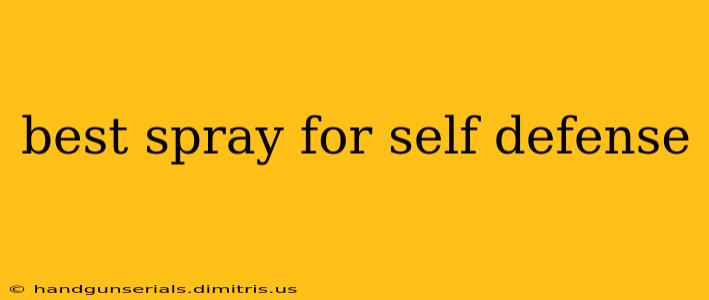Choosing the right self-defense spray can be daunting. With a plethora of options on the market, understanding the key factors—from the type of spray to legal considerations—is crucial. This guide will help you navigate the choices and select the best spray for your self-defense needs. We'll explore different types of sprays, legal implications, and best practices for carrying and using them effectively.
Types of Self-Defense Sprays
The most common type of self-defense spray is pepper spray, also known as OC spray (oleoresin capsicum). It contains capsaicinoids, the compounds that give chili peppers their heat. The intensity of the spray varies depending on the concentration of capsaicinoids. Higher concentrations generally mean a more potent effect, but also a potentially greater chance of causing prolonged discomfort.
Beyond pepper spray, you might also find:
- Bear spray: This is significantly more potent than pepper spray, intended for deterring large animals. While effective for self-defense, its intensity makes it less suitable for situations where you need a more controlled level of incapacitation. It is also generally more expensive. Importantly, the use of bear spray in self-defense situations against humans may have different legal ramifications depending on your location; check your local laws.
- CS gas (tear gas): This creates temporary burning and tearing of the eyes, but is considered less effective than pepper spray in incapacitating an attacker.
Factors to Consider When Choosing a Self-Defense Spray
Several factors influence the effectiveness and suitability of a self-defense spray:
1. Concentration of Capsaicinoids (for pepper sprays):
A higher concentration generally means a more potent effect. Look for sprays with a concentration clearly stated on the packaging. However, remember that higher concentration doesn't always equate to better self-defense, and excessive force could have legal implications.
2. Range and Spray Pattern:
Consider the spray's range and pattern. A wider spray pattern might be better for covering a larger area, while a more focused stream might be more effective at a distance. A cone spray is usually a good compromise between reach and coverage.
3. Size and Portability:
Choose a size that's convenient for carrying discreetly, yet contains enough spray for effective use. A smaller size may be more practical for everyday carry, while a larger one may offer longer duration.
4. Brand Reputation and Quality:
Research different brands and look for reviews from trusted sources. Reputable brands typically adhere to higher quality standards and provide more reliable performance.
5. Legal Considerations:
Laws regarding self-defense sprays vary significantly by location. It's crucial to understand the legal restrictions in your area before purchasing or carrying any self-defense spray. This includes understanding the permissible concentration, carrying restrictions, and the legal requirements for using it in self-defense. Consult local law enforcement or legal professionals for accurate and up-to-date information.
Safe Handling and Use of Self-Defense Spray
- Practice: Familiarize yourself with the spray's operation before needing to use it.
- Wind Conditions: Avoid using the spray in windy conditions, as the spray can be blown back towards you.
- Aim: Aim for the attacker's face, specifically the eyes.
- Distance: Maintain a safe distance to avoid close-quarters confrontation.
- After Use: Report the incident to the authorities immediately after using the spray in self-defense.
Conclusion
Selecting the best self-defense spray is a personal decision based on your individual needs and circumstances. Understanding the different types of sprays, legal ramifications, and safe usage practices is paramount. Always prioritize safety and legality, and remember that self-defense spray should be used only as a last resort. This guide offers a foundation for your research; always consult with relevant authorities and professionals for specific advice tailored to your location and situation. Remember, responsible ownership and usage are key.

